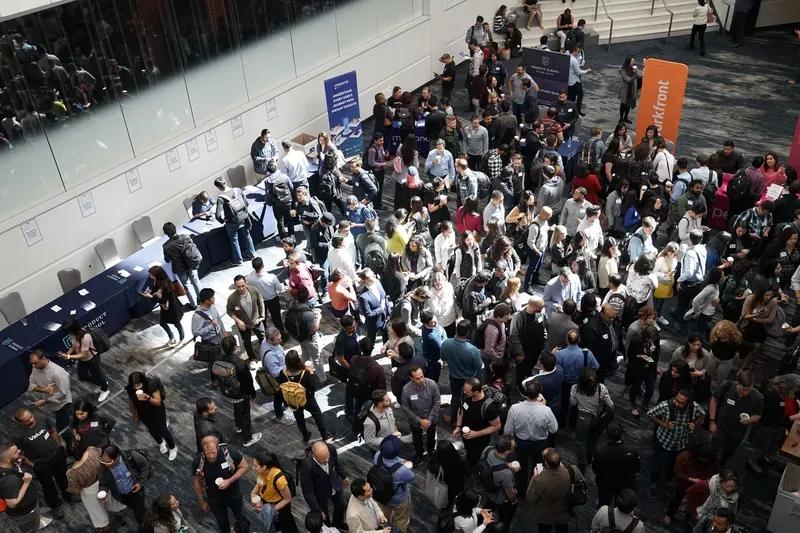As an event organizer, building a thriving community around your events is crucial for success. Connecting with attendees before, during, and after events is essential for building relationships and promoting engagement. In this article, we will explore the top five strategies for building a strong community around your events and engaging large audiences.
1. Segment Your Audience
Segmenting your audience is a crucial first step in creating successful events. By dividing your attendees into specific groups based on their interests, job titles, or other relevant criteria, you can create tailored content and engagement or community building strategies that are more effective at reaching each group.
In order to properly segment your attendees, it's important to gather and analyze information from different channels. In a first step, you can do this with the registration and ticketing platforms, but it doesn’t have to stop there. There are many other platforms that make it possible to obtain more data, such as interests and values from current and future attendees to improve your segmentation. It provides valuable insights into the characteristics of your audience, in order to to create more engaging and personalized groups and experiences. And yes, UNBLND makes this happen!
So take the time to segment your audience and create targeted messaging and engagement strategies – it will pay off in the form of increased attendee satisfaction and engagement, as well as stronger brand awareness and loyalty.
2. Host Pre- and Post-Networking Events
Hosting pre- and post-event networking events are crucial to building a thriving event community. These events provide attendees with opportunities to connect with each other before and after the main event, building relationships and fostering a sense of community. By nurturing these connections, attendees are more likely to feel engaged and more likely to attend future events.
With pre-event networking events, attendees get a chance to get to know each other before the main event which can can help break the ice and make it easier for attendees to connect with each other during the main event itself. Pre-event networking events can be structured in many different ways, from casual meet-and-greets to more structured activities like online niche-groups, virtual spaces and speed networking sessions.
Post-event networking events are just as important as pre-event events. With these events, you are extending the length of your event and providing attendees with more opportunities to connect and network. It allows attendees to reflect on the event and connect with each other after the main event has ended. It provides the opportunity to continue the conversation the attendees started during the main event and build on the relationships that they have formed.
3. Organise On-Site Networking During the Event
In addition to hosting pre- and post-event networking events, you can also create opportunities for attendees to connect during the event itself and facilitate engagement.
Encourage attendees to engage with one another and with your event by providing opportunities for interaction. Use tools such as live polls, Q&A sessions, and breakout sessions to facilitate engagement and create a more interactive experience for attendees. Consider creating chat groups or other online forums to encourage ongoing engagement after your event.
During the event, hosting interest-based side events is a good idea. For example, if your event is focused on technology, you could host a break-out session specifically for attendees who’re interested in cybersecurity or the relation between AI and ethics. If your event is focused on sports, you could host workshops on sports-related topics such as nutrition, training, and injury prevention.
Social networks are an incredibly powerful tool for connecting with attendees and building a strong community around your events. Be sure to leverage social networking platforms to get to know your attendees interests and connect them, to share important information about your event and drive engagement. With so many platforms available, it can be difficult to know which ones to focus on. In this article, you can explore the top social networking platforms for event organisers and businesses.
Of course, we’d like to focus on… UNBLND, where you can create automated networking groups and dedicated (sub-)events for attendees to connect, interact and share valuable experiences. In addition, the mobile app offers features like networking lounges, live chat, for online events and in-real-life events. It is perfect to start engaging your audience prior to the event so attendees get to know each before the in-real-life event starts.
By utilising our social network to its fullest potential, you can create a truly immersive event that will leave a lasting impression on everyone who attends. And they will be able talking about long after it's over in your dedicated event space.
5. Measure and Analyse Results
Measuring and analysing the results of your events and engagement strategies is crucial for understanding what works and what doesn't. Use tools such as surveys, feedback forms, and social networking analytics to track engagement and analyze the success of your strategies. Use this data to refine your strategies for future events and to continue building a strong community around your events.
Conclusion
In conclusion, building a thriving community around your events is key to success as an event organizer. By using social networks, hosting networking events, segmenting your large audience, facilitating engagement, and measuring results, you can create a strong and engaged community around your events that will set you apart from the competition. UNBLND can make much of this possible. So check it out. Good luck!

